Share
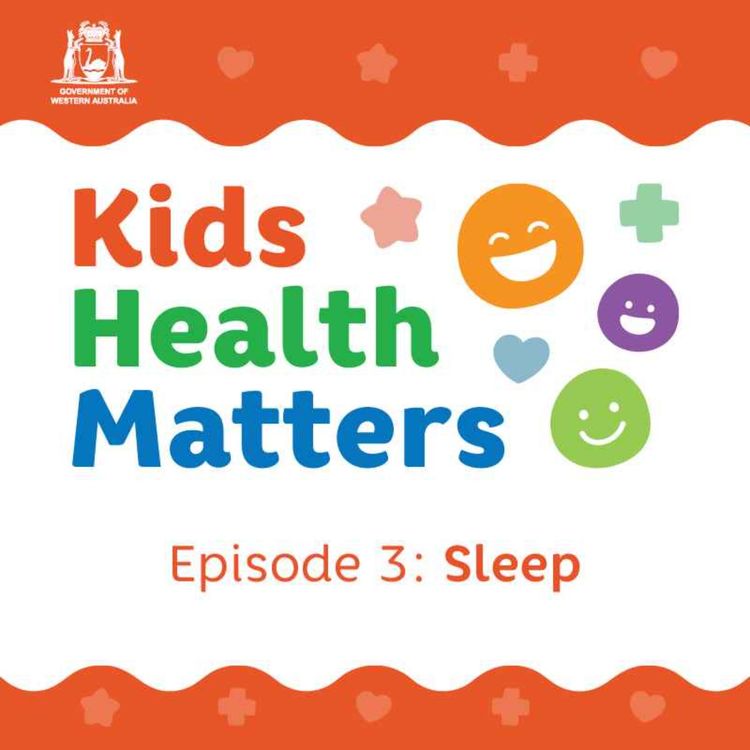
Kids Health Matters
Sleep
The latest episode of Kids Health Matters explores the topic most likely to keep parents awake at night – sleep.
Parents commonly ask what’s normal? Are there any golden rules and when is melatonin useful?
In this discussion our sleep experts answer these questions and gently guide listeners through their advice on how to best support sleep for babies through to teens.
Spotting sleep concerns that may indicate a medical issue is also a focus of the discussion.
Kids Health Matters provides trusted advice on common child health concerns from leading experts at the Child and Adolescent Health Service (CAHS).
Child and Adolescent Community Health (CACH) Child Health Nurse, Kim Shirras and Perth Children’s Hospital (PCH) Respiratory and Sleep Consultant Dr Adelaide Withers team up to talk through the most common questions parents ask about sleep at their child health appointments and at the hospital.
Our experts emphasise how each family, each child and each home is different.
Kim draws on her wealth of experience in advising parents on sleep and settling techniques, particularly through her work in running ‘Early Parenting’ and the ‘Let’s Sleep’ groups to discuss:
- why consistency is key
- awake windows for babies
- reassessing routines
- shifting sleep time for a ‘late to sleep’ child and
- the importance of activity for toddlers.
Kim reassures parents that calm and responsive parenting is always the best approach when tackling issues around sleep.
In addition to co-hosting the episode with broadcaster Dani Shuey, Dr Adelaide shares her valuable insights from the sleep clinic at PCH.
Dr Adelaide urges parents to reach out for support, look after themselves and not to underestimate the importance of their own sleep.
Further information about the series can be found at https://cahs.health.wa.gov.au/Kidshealthmatters
Kids Health Matters is proudly produced by CAHS which includes Neonatology, CACH, Child and Adolescent Mental Health Services and PCH.
More episodes
View all episodes
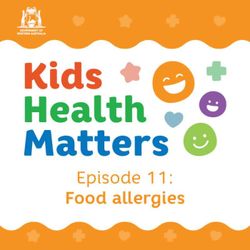
11. Food Allergies
25:14||Season 1, Ep. 11With rising rates of allergies in Australian children, many parents are struggling to navigate the growing minefield of allergy information and advice that’s out there.If you’re confused about when to introduce your child to nuts, whether it’s wise to avoid certain foods altogether or the difference between a contact and allergic reaction, you’re not alone.Be sure to tune into this episode of Kids Health Matters as Perth Children’s Hospital (PCH) Immunologist Dr Michael O’Sullivan and Senior Dietitian Kath Harrigan team up to tackle all things allergy-related. The pair’s practical and easy-to-understand advice will help you sort fact from fiction and guide you through the tricky terrain of food allergies in children.In this episode, Kath draws on her decades of dietetics experience to share practical advice on reducing stress around food allergies through: managing the introduction of food understanding food labelling and tips for teens with food allergies.Dr Michael, will take you through the ins and outs of:testingmanaging severe allergic reactions and the most common food allergy in infants and children. The renowned food allergy researcher will also explain the importance of an accurate diagnosis in helping you know what foods to avoid – and not to avoid – and the vital role of your GP.Dr Michael emphasises the importance of regularly eating different foods as a way of training the body’s immune system in early life. “The best way to prevent allergies in the future is to start allergy prone foods, such as nut pastes and egg, as early as possible and keep giving them to your child regularly.” Dr Michael said. “For instance it’s important to keep trying to expose a baby to different types of tree nuts even if they have had a reaction to peanuts,” Dr Michael said. He will even share insights into treatments on the horizon thanks to new research.“Traditionally we have taken a ‘one size fits all’ approach to food allergies. “Our clinical trials are allowing us to consider future options and choice for families in how they can manage a child’s food allergy,” Dr Michael said. Kids Health Matters provides trusted advice on common child health concerns from leading Western Australian child health experts.This episode is hosted by broadcaster Dani Shuey and PCH Respiratory Consultant Dr Adelaide Withers.Further information about the podcast series including full show notes and transcripts are available at https://cahs.health.wa.gov.au/KidsHealthMattersKids Health Matters is proudly produced by CAHS which includes Neonatology, Child and Adolescent Community Health, Child and Adolescent Mental Health Services and Perth Children’s Hospital.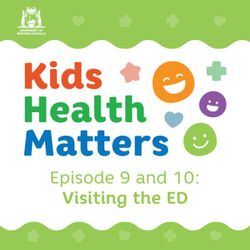
10. Emergency Department Part 2
14:45||Season 1, Ep. 10An unexpected health emergency for a baby, child or young person can be traumatic, especially if it involves a trip to the emergency department (ED). While we hope you will never have to visit the Perth Children’s Hospital (PCH) ED, in the event you do, it can help to know what to expect when you arrive.In this special two-part episode of Kids Health Matters we join Paediatric Emergency Specialist and General Paediatrician Dr Paul Sander to take you behind the scenes at our busy ED.In this second part of a two-part discussion, Dr Paul will arm you with knowledge to help you manage common illnesses.He responds to common ED concerns, with a series of rapid-fire questions such as:when is a rash of concernwhy is it important to know the duration of a fever andat what point should we worry about our child’s temperature?Dr Paul also shares with us what he loves about working in PCH’s ED, which last year treated around 70,000 babies, children and young people.Make sure you listen to the first part of the conversation, where Dr Paul explains what happens when you visit a Perth emergency department.For a full episode transcript and show notes, visit cahs.health.wa.gov.au/kidshealthmattersKids Health Matters provides trusted advice on common child health concerns from leading Western Australian child health experts.The podcast is proudly produced by the Child and Adolescent Health Service which includes Neonatology, Child and Adolescent Community Health, Child and Adolescent Mental Health Services and PCH.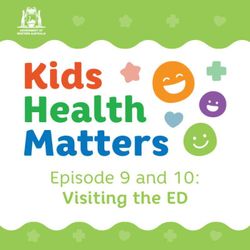
9. Emergency Department Part 1
15:15||Season 1, Ep. 9An unexpected health emergency for a baby, child or young person can be traumatic, especially if it involves a trip to the emergency department (ED). While we hope you will never have to visit the Perth Children’s Hospital (PCH) ED, in the event you do, it can help to know what to expect when you arrive.In this special two-part episode of Kids Health Matters we join Paediatric Emergency Specialist and General Paediatrician Dr Paul Sander to take you behind the scenes at our busy ED.With the help of hosts broadcaster Dani Shuey and PCH Respiratory Consultant Dr Adelaide Withers, Dr Paul will offer insights from his more than 15 years in emergency care to help you prepare for any unplanned ED visit, with useful tips on:what you should bring who you are likely to seeassessments your child might be given andsupporting your child through the visit.Dr Paul will also take you through some of the most common reasons for children being brought into ED, the age range of children treated at PCH and the best sources for accessing reliable health information.Don't miss part 2 of this chat, where Dr Paul tackles some quick-fire questions around common concerns which we often see in the ED.For a full episode transcript and show notes, visit cahs.health.wa.gov.au/kidshealthmattersKids Health Matters provides trusted advice on common child health concerns from leading Western Australian child health experts.The podcast is proudly produced by the Child and Adolescent Health Service which includes Neonatology, Child and Adolescent Community Health, Child and Adolescent Mental Health Services and PCH.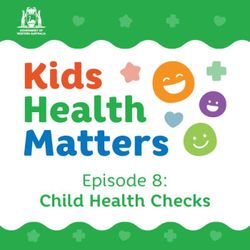
8. Child Health Checks
27:54||Season 1, Ep. 8Parenting a child of any age can be overwhelming at the best of times. Knowing who to turn to for trusted and consistent advice and support is key to navigating the challenges.In this episode of Kids Health Matters our guest expert discusses why ‘milestones matter’ and how invaluable child health nurses can be in supporting parents and carers. The Kids Health Matters podcast series provides valuable advice on common child health concerns and issues from leading experts at the Child and Adolescent Health Service (CAHS).In ’Milestones Matter’ we introduce you to Brooke Cini, one of our ‘dynamic dual role’ nurses at CAHS who is passionate about working as both a Child Health Nurse in the community with Child and Adolescent Community Health (CACH) and a nurse on the surgical ward at Perth Children’s Hospital (PCH). Brooke said as a child health nurse she not only checks that babies and toddlers are healthy and progressing well but that parents are adjusting to their new role. “Re-assurance, non-judgemental support and guidance are the cornerstones of our work as child health nurses. “We want to be able to support parents to give their children the best possible start in life,” Brooke said. Brooke reveals the most common questions child health nurses get asked by parents and she discusses:the importance of child health checks and developmental milestoneshow they can assist on any issues of concernswhy there are no ‘silly’ questionswhy the ‘purple book’ is a ‘one stop shop’ and how parenting groups can help parents build a supportive network. The importance of two-year-old health checks to identify any concerns and to help get children ‘school ready’ is also emphasised. This is the last of the five scheduled contacts. This episode is hosted by broadcaster Dani Shuey and CAHS Coordinator of Nursing in Infection Prevention and Control, Danielle Engelbrecht.Further information about the podcast series including a link to this episode can be found on the Kids Health Matters homepage.Kids Health Matters is proudly produced by CAHS which includes Neonatology, CACH, Child and Adolescent Mental Health Services and PCH.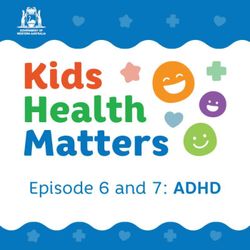
7. ADHD Part 2
31:26||Season 1, Ep. 7Inattention, impulsivity and distractibility tend to dominate discussion around attention deficit hyperactivity disorder (ADHD).But children with ADHD can also be creative, delightful and innovative according to one of our State’s leading experts on this neurodevelopmental disorder.Dr Brad Jongeling, Medical Head of the Child Development Service at the Child and Adolescent Health Service (CAHS) and Consultant Paediatrician, unravels the complexities of ADHD in this special two-part episode.The series provides trusted advice on common child health concerns from leading experts at CAHS.In this episode Dr Brad provides an insight into and understanding of the disorder in easy-to-understand terms.The discussion covers:what to do if you are concerned your child may have ADHD.what’s involved with a diagnostic assessment.how it impacts individuals and families.the factors considered in an assessment.Support options available to children and families impacted is also highlighted particularly supports available while waiting for an assessment. Dr Brad draws on a wealth of experience in this field including work with the Royal Australasian College of Physicians and the National Health and Medical Research Council’s review of ADHD.He is also involved with training registrars and students across Australia and at The University of Western Australia in developmental paediatrics.This episode is hosted by broadcaster Dani Shuey and CAHS Coordinator of Nursing in Infection Prevention and Control, Danielle Engelbrecht.Further information about the podcast series and full show notes for all episodes can be found at https://cahs.health.wa.gov.au/KidsHealthMattersKids Health Matters is proudly produced by CAHS which includes Child and Adolescent Community Health, Neonatology, Child and Adolescent Mental Health Services and Perth Children’s Hospital.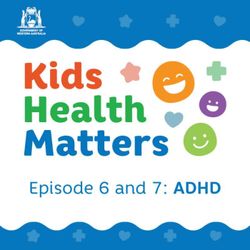
6. ADHD Part 1
25:56||Season 1, Ep. 6Inattention, impulsivity and distractibility tend to dominate discussion around attention deficit hyperactivity disorder (ADHD).But children with ADHD can also be creative, delightful and innovative according to one of our State’s leading experts on this neurodevelopmental disorder.Dr Brad Jongeling, Medical Head of the Child Development Service at the Child and Adolescent Health Service (CAHS) and Consultant Paediatrician, unravels the complexities of ADHD in this special two-part episode.The series provides trusted advice on common child health concerns from leading experts at CAHS.In this episode Dr Brad provides an insight into and understanding of the disorder in easy-to-understand terms.The discussion covers:what to do if you are concerned your child may have ADHD.what’s involved with a diagnostic assessment.how it impacts individuals and families.the factors considered in an assessment.Support options available to children and families impacted is also highlighted particularly supports available while waiting for an assessment. Dr Brad draws on a wealth of experience in this field including work with the Royal Australasian College of Physicians and the National Health and Medical Research Council’s review of ADHD.He is also involved with training registrars and students across Australia and at The University of Western Australia in developmental paediatrics.This episode is hosted by broadcaster Dani Shuey and CAHS Coordinator of Nursing in Infection Prevention and Control, Danielle Engelbrecht.Further information about the podcast series and full show notes for all episodes can be found at https://cahs.health.wa.gov.au/KidsHealthMattersKids Health Matters is proudly produced by CAHS which includes Child and Adolescent Community Health, Neonatology, Child and Adolescent Mental Health Services and Perth Children’s Hospital.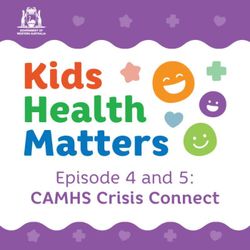
5. CAMHS Crisis Connect Part 2
12:38||Season 1, Ep. 5Following on from the previous episode, CAMHS Clinical Nurse Specialist Veronica Plej is back for Part 2 of this important conversation.She is here to tell us all about CAMHS Crisis Connect and how the service can help to support a young person experiencing a mental health crisis.The team behind the service are dedicated and expert mental health professionals who are an excellent source of advice, information and support for young people and families who are struggling with their mental health.Veronica emphasises that while Crisis Connect can be an alternative to visiting a metropolitan emergency department within a hospital, you don’t have to be in crisis to contact the service.Veronica also recommends anyone working with or caring for someone impacted by poor mental health should prioritise self-care. CAMHS Crisis Connect can be contacted on 1800 048 646.It is a free 24 hours a day, 7 days a week, Perth metropolitan service.The Kids Health Matters series provides trusted advice on common child health concerns from leading experts at the Child and Adolescent Health Service (CAHS).The podcast is proudly produced by CAHS which includes Neonatology, Child and Adolescent Community Health, Child and Adolescent Mental Health Services and Perth Children’s Hospital. Read the full show notes at https://cahs.health.wa.gov.au/KidsHealthMatters.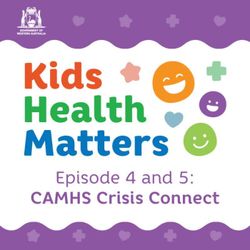
4. CAMHS Crisis Connect Part 1
15:21||Season 1, Ep. 4Supporting a young person experiencing a mental health crisis is a distressing reality for many parents and carers.Where can you turn for help? How do you respond? How do you offer support?In the latest episode of Kids Health Matters our guest expert answers these and other difficult questions and provides insight and advice to help understand and support a young person in crisis.Clinical Nurse Specialist Child and Adolescent Mental Health Services (CAMHS) Crisis Connect Veronica Plej shares expertise from her three-decade nursing career including specialising in youth mental health over the last 9 years.Veronica emphasises a young person who feels secure and supported is more likely to reach out for help. This is one of the key messages to emerge from this two-part discussion. Veronica also shares practical advice on:identifying what constitutes a crisis compared to a ‘rough patch’how to start a conversation if you are concerned about signs of withdrawal or depressionwhat are the signs of depression andhow to respond to a child who is refusing to go to school.Veronica recommends that generally less talking and more listening in these incredibly stressful situations tends to be more helpful. Don't miss the second part of this conversation to learn how the CAMHS Crisis Connect service can help, supporting young people and their families.CAMHS Crisis Connect can be contacted on 1800 048 646.It is a free 24 hours a day, 7 days a week, Perth metropolitan service. Kids Health Matters provides trusted advice on common child health concerns from leading experts at the Child and Adolescent Health Service (CAHS).The podcast is proudly produced by CAHS which includes Neonatology, Child and Adolescent Community Health, Child and Adolescent Mental Health Services and Perth Children’s Hospital.